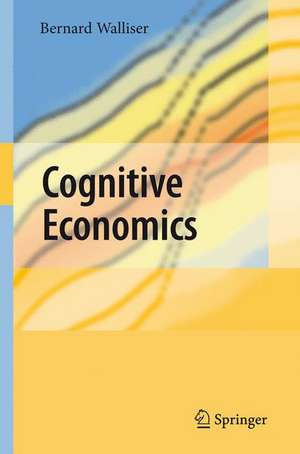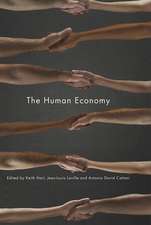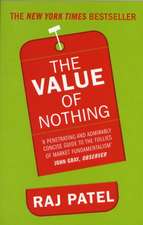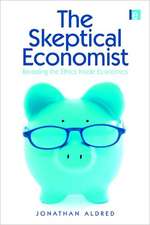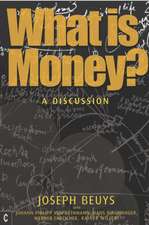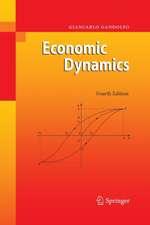Cognitive Economics
Autor Bernard Walliseren Limba Engleză Hardback – 12 noi 2007
The book mainly aims at extending the framework of game theory in order to better fit the results of rapidly increasing laboratory experiments concerned with individual choices and collective interactions. It also seeks to better explain some original economic phenomena involving boundedly rational agents in an institutional setting such as financial bubbles, job search or technological innovation.
Written in an informal way, the book is addressed to philosophers or cognitive scientists curious of how economics deal with cognition, as well as graduate students in economics eager to discover how economic science evolves.
| Toate formatele și edițiile | Preț | Express |
|---|---|---|
| Paperback (1) | 635.47 lei 6-8 săpt. | |
| Springer Berlin, Heidelberg – 15 oct 2010 | 635.47 lei 6-8 săpt. | |
| Hardback (1) | 640.37 lei 6-8 săpt. | |
| Springer Berlin, Heidelberg – 12 noi 2007 | 640.37 lei 6-8 săpt. |
Preț: 640.37 lei
Preț vechi: 753.39 lei
-15% Nou
Puncte Express: 961
Preț estimativ în valută:
122.59€ • 127.91$ • 102.76£
122.59€ • 127.91$ • 102.76£
Carte tipărită la comandă
Livrare economică 13-27 martie
Preluare comenzi: 021 569.72.76
Specificații
ISBN-13: 9783540713463
ISBN-10: 3540713468
Pagini: 196
Ilustrații: VII, 185 p.
Dimensiuni: 155 x 235 x 16 mm
Greutate: 0.42 kg
Ediția:2008
Editura: Springer Berlin, Heidelberg
Colecția Springer
Locul publicării:Berlin, Heidelberg, Germany
ISBN-10: 3540713468
Pagini: 196
Ilustrații: VII, 185 p.
Dimensiuni: 155 x 235 x 16 mm
Greutate: 0.42 kg
Ediția:2008
Editura: Springer Berlin, Heidelberg
Colecția Springer
Locul publicării:Berlin, Heidelberg, Germany
Public țintă
ResearchCuprins
Structure of individual beliefs.- Change of individual beliefs.- Decision-making as reasoning.- Dynamic action and belief revision.- Coordination of players through beliefs.- Learning processes among players.- Communication and reasoning in an economic system.- Evolution of the economic system.
Textul de pe ultima copertă
As a manifestation of a 'cognitive turn' observable in all social sciences, Cognitive Economics is concerned with the beliefs and mental operations held by actors placed within a dynamical and strategic environment. It appears as a synthesis of an educative research program, dealing with crossed expectations of actors, and an evolutionist research program on collective learning processes.
The book mainly aims at extending the framework of game theory in order to better fit the results of rapidly increasing laboratory experiments concerned with individual choices and collective interactions. It also seeks to better explain some original economic phenomena involving boundedly rational agents in an institutional setting such as financial bubbles, job search or technological innovation.
Written in an informal way, the book is addressed to philosophers or cognitive scientists curious of how economics deal with cognition, as well as graduate students in economics eager to discover how economic science evolves.
The book mainly aims at extending the framework of game theory in order to better fit the results of rapidly increasing laboratory experiments concerned with individual choices and collective interactions. It also seeks to better explain some original economic phenomena involving boundedly rational agents in an institutional setting such as financial bubbles, job search or technological innovation.
Written in an informal way, the book is addressed to philosophers or cognitive scientists curious of how economics deal with cognition, as well as graduate students in economics eager to discover how economic science evolves.
Caracteristici
Insight in how an economist handles human cognition, by incorporating various concepts and schemes into game theory Insight in how relevant cognition is in classical economics (e.g. financial speculation, job search, technological innovation) Includes supplementary material: sn.pub/extras
